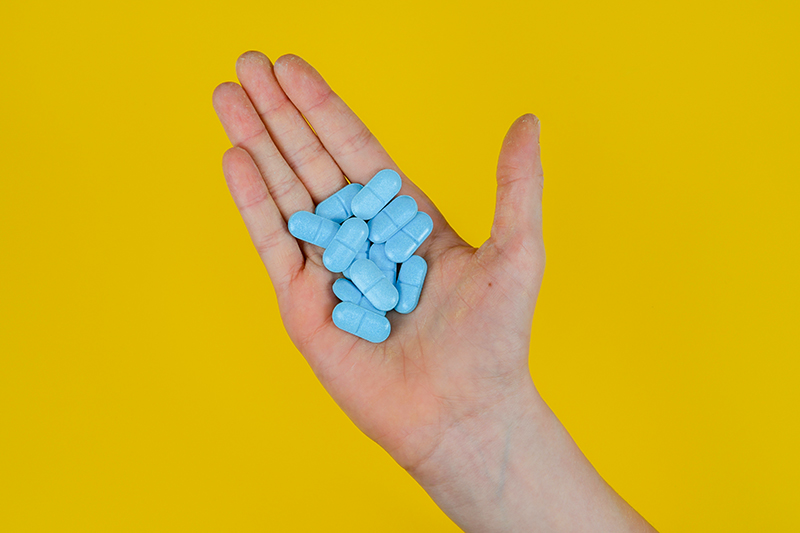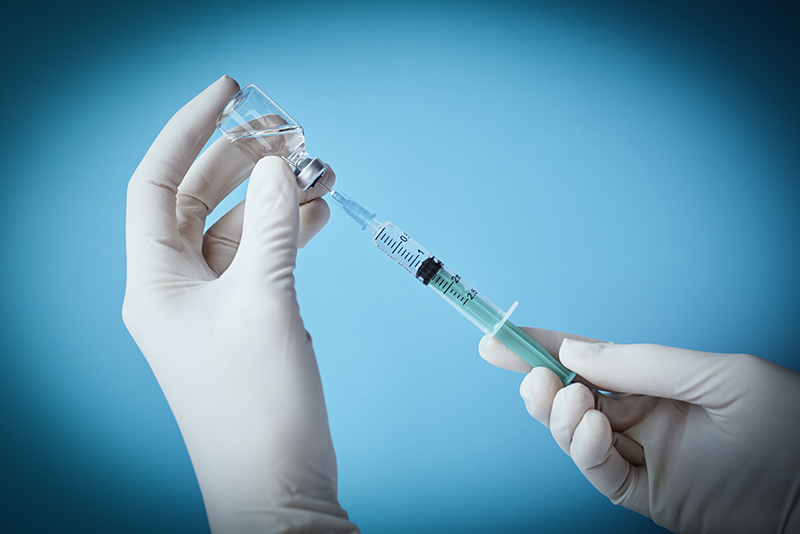Protected by PrEP
As Kaiser study shows daily Truvada use to be effective in preventing HIV, patients say they don't regret their decision to start PrEP

Chris Wilburn was initially skeptical of Truvada, the anti-HIV drug also known as PrEP.
“I remember at the time, not being in the mindset of ‘Oh, this is a great idea,'” says Wilburn. “Honestly, the gut reaction for me was a lot of the slut-shaming that I’m very against now.”
Wilburn saw PrEP — or pre-exposure prophylaxis — as a drug that would encourage further promiscuity and reckless sexual practices, even though he admits that he and his boyfriend of 10 years used condoms infrequently.
“Most of those times, when we were with other people, we would both top, and that was our way of kind of excusing ourselves,” he says. “So it felt like a good option for us to go on PrEP, but it took a year of us discussing it, and asking around, and figuring out, ‘Yeah we are okay with this. This makes sense for us.'”
Since starting on Truvada more than a year ago, Wilburn says he and John have never missed a dose. They get tested every three months for HIV and other sexually-transmitted diseases. Their condom use has decreased slightly, but was low to begin with. Their number of partners has increased, but they feel the drug has allowed them to be more sexually open.
Much of Wilburn’s initial opposition stemmed from his conservative religious upbringing and guilt about the open nature of his relationship.
“Society always had taught me sex was dirty, and the only way to not fear it was to make it sterile,” he explains. “There is a sense of freedom post-PrEP and a lifting of the guilt and self-shaming that was the initial cause of my slut-shaming. This is something shared with my friends who are also on PrEP…. We often call it the beginning of a second sexual revolution — and we know that scares a lot of people.”
There has been no debate more contentious than the one surrounding PrEP, particularly among men who have sex with men, who are considered more at risk for transmission of HIV. The largest concerns have focused on Truvada’s efficacy, the prevalence of condom use among those who choose to take it, and the level of compliance, given that the drug has to be taken daily.
In a recent study examining the use of PrEP, published in Clinical Infectious Diseases, not one of insurer Kaiser Permanente’s 657 Californian clients who took a daily dose of Truvada became infected with HIV over a two-year period. Condom use among the subjects did decrease, and about half of the study participants, all but four of whom were gay men, contracted another sexually-transmitted disease such as syphilis, gonorrhea or chlamydia within a year. Yet the news was hailed by many proponents of PrEP, who pointed to the lack of new HIV infections as evidence of its effectiveness.
Dr. Ray Martins, senior director of Clinical Education and Training at Whitman-Walker Health, which specializes in HIV-related care, says that all studies or trials of PrEP appear to show a range of effectiveness — though all depend on patients regularly taking the drug as prescribed.
“I was expecting it to be extremely effective, but I was not expecting it to be 100 percent,” Martins says of the Kaiser study’s findings. Researchers are planning a follow-up study of 1,500 participants from across the country, 300 of whom will be enrolled at Whitman-Walker.
Martins says that prior to the Kaiser study, most other studies involving PrEP did not show an increase in potential risk-taking behavior. He also notes, anecdotally, that from what he’s seen among his own patients who are on PrEP, there hasn’t been an uptick in STDs, even though a quarter of patients admit to using condoms less frequently. Yet about 80% of those rarely used condoms to begin with. For Martins, it illustrates the fact that the availability of PrEP is largely not going to change people’s sexual behaviors or the amount of risk they take.
Michael Weinstein, president of AIDS Healthcare Foundation, came under fire from several HIV/AIDS activists and proponents of PrEP last year for referring to Truvada as a “party drug” in a USA Today article. Weinstein says that AHF’s stance has been misrepresented: the organization has never been completely opposed to PrEP, but has reservations about adopting PrEP as part of a public health strategy — such as that adopted by New York state — and worries about creating a culture in which condom use is discouraged.
“If you look at what’s happened, when the FDA approved it, the line that everyone was using was that it was another tool to be used with condoms,” Weinstein says. “Part of my concern, and AHF’s concern, was we didn’t believe that was how it would be used.”
Weinstein says that some proponents of PrEP are promoting unprotected sex rather than using condoms in addition to PrEP. One of the more extreme examples is the Australian activist group SEEIT CLEARLY2020, which is behind a proliferation of posters in Melbourne that say “Now you can fuck raw. PrEP works. No more HIV.”
“Obviously, for people who will never use a condom, PrEP is better than no protection,” says Weinstein. “People who always use a condom don’t need PrEP. Negative people whose partners are undetectable, if they’re confident and comfortable that the person is undetectable, then there’s no need for PrEP.”
Weinstein also notes that Truvada is only effective if users are regularly adherent, but previous studies have shown that adherence drops off among people of lower incomes and educational levels, younger patients, and communities of color. That’s why failing to continue to promote condom use is not a responsible public health strategy. Additionally, he warns that, because Truvada only protects against HIV and not other STDs, adopting a cavalier attitude towards diseases like syphilis, gonorrhea and chlamydia because they are more easily treated than HIV is short-sighted.
AHF began running ads primarily geared towards gay and bisexual male audiences that repeat the established U.S. guidelines for the use of PrEP. The advertisements, titled “Reaching Common Ground on PrEP,” stress which groups of people are ideal candidates for PrEP, emphasize regular testing and daily adherence, and warn against undue influence by pharmaceutical giants on doctors. AHF also aims for future medical advances, such as an implant that delivers a steady dose of medication or an injection that would provide protection for a number of months, that would be more reliable than a daily pill in ensuring adherence to PrEP.
“The other thing that’s been really unfortunate over the past few years is there’s been an attempt to shut down the conversation,” says Weinstein. “Anyone who has any concerns is automatically labeled as a stigmatizer…. It’s really been a matter of attack first, talk later…. It has a bad influence within the LGBT community, the fact that we can’t actually discuss these issues without bashing each other.”
AHF and other skeptics — among them gay playwright Larry Kramer — aren’t the only ones that have borne the brunt of attacks in the debate over PrEP. Joseph Givens, a 29-year-old who’s been on Truvada for over a year, says being public about his decision to go on PrEP has earned him negative feedback from his social group. He’s been called a “Truvada whore,” even by his former partner.
“They think that being on it automatically makes you think that you have the right to be promiscuous and have unprotected sex,” says Givens. “That’s not true. Being on PrEP has made me more aware of my HIV status.”
Givens, who decided to go on Truvada because of a prior relationship where his partner had been cheating on him, has in fact decreased his number of partners since starting the drug regime, and has increased his condom use, particularly when sexually engaging with a person he doesn’t know well.
Sean Wieland views PrEP as an added layer of protection, one he would recommend any gay male who is not monogamous to consider. Although initially leery about potential toxic side effects of the drug — some friends reported problems with severe nausea — Wieland’s decision was affected by an incident that required him to undergo post-exposure prophylaxis, where patients take antiretrovirals to avoid contracting HIV.
“I’m somebody who came out twenty-one years ago. I grew up in the HIV epidemic,” he says. “Look at what happened in the eighties. Look at your own behavior. This is something that has thus far been proven. Yes, there could be adverse side effects down the road. But I would much rather be part of the generation that is taking it, and shows that it is going to prevent transmission. There’s a risk of any drug.”
The biggest hindrance to going on PrEP for Wieland is the fact that only some insurance plans cover Truvada, and people aren’t always aware of programs at places such as Whitman-Walker that help cover the cost and provide co-pay assistance to Truvada users. Since starting PrEP, Wieland has become a strong advocate for the treatment, defending it to friends and acquaintances who question that decision.
“Regardless of how you feel about this drug, it’s something that’s a tool that’s available for us to reduce the transmission rate,” Wieland adds. “Science is progressing, but if there’s a pill that allows me to continue what I’m doing sexually, and minimizes my risk, I’m going to take it.”
Also Read: The Trouble with “Stonewall” — Roland Emmerich’s latest disaster movie[/pullquote]
Support Metro Weekly’s Journalism
These are challenging times for news organizations. And yet it’s crucial we stay active and provide vital resources and information to both our local readers and the world. So won’t you please take a moment and consider supporting Metro Weekly with a membership? For as little as $5 a month, you can help ensure Metro Weekly magazine and MetroWeekly.com remain free, viable resources as we provide the best, most diverse, culturally-resonant LGBTQ coverage in both the D.C. region and around the world. Memberships come with exclusive perks and discounts, your own personal digital delivery of each week’s magazine (and an archive), access to our Member's Lounge when it launches this fall, and exclusive members-only items like Metro Weekly Membership Mugs and Tote Bags! Check out all our membership levels here and please join us today!

























You must be logged in to post a comment.